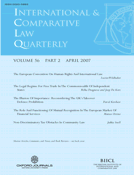ICLQ Articles on Harding v Wealands and the Law of Domicile
 There are two short articles in the private international law current developments section of the new issue of the International & Comaparative Law Quarterly (2007, Volume 56, Number 2).
There are two short articles in the private international law current developments section of the new issue of the International & Comaparative Law Quarterly (2007, Volume 56, Number 2).
Charles Dougherty and Lucy Wyles (2 Temple Gardens) have written a casenote on the decision of the House of Lords in Harding v Wealands [2006] UKHL 32 (see all of our relevant posts here.) Here’s the introduction:
In Harding v Wealands1 the House of Lords had to consider the vexed question of where the dividing line between substance and procedure should lie in private international law. The specific issue before their Lordships was whether matters relating to the assessment of damages in tort should be treated as matters of substance, and thus be for the applicable law, or whether they should be treated as matters of procedure, and therefore be left for the law of the forum. The decision of the House of Lords has resolved this difficult question in favour of a procedural characterization. The result of the House of Lords decision is that in all such cases, regardless of the foreign law element, the assessment of damages will be conducted in accordance with English (Northern Irish or Scottish) law, as the law of the forum. Nonetheless, some reservations do exist as to the justification for the decision and as to how likely it is to remain the last word on the subject.
In addition, the decision of the Court of Appeal remains of some importance in relation to the determination of the law applicable to a foreign tort. In the light of their decision on the difference between substance and procedure, the House of Lords found it unnecessary to interfere with the decision of the Court of Appeal in this regard.
There is also a piece on Regression and Reform in the Law of Domicile by Peter McEleavy. Here’s a taster:
In the United Kingdom the law pertaining to domicile has the rather dubious distinction that, although subjected to concerted criticism from commentators and law reformers alike for over half a century, it has largely remained unchanged. Common law jurisdictions around the world have succeeded in passing legislation which, to varying degrees, has modernized the concept, yet in Britain a series of initiatives have either failed to complete the legislative process or not even made it to Parliament.3 The reason in each instance was less the substance of the proposals, but rather political expediency in the face of pressure from the overseas business community resident in the United Kingdom, who feared extended fiscal liability if the connecting factors were attributed with a less legalistic interpretation.
The consequence is that 19th and early 20th century values continue to apply, but they do so in a world where, inter alia, individual mobility is taken for granted, migration has reached unprecedented levels6 and there is a greater awareness of and respect for other legal traditions. Trends in case law appear to suggest new approaches have emerged but have failed to take hold. To a certain degree this is not surprising as domicile, like habitual residence, applies in a variety of distinctive areas and is therefore prey to contrasting policy considerations,10 with result selection long regarded as playing an implicit role in many cases.11 However, in contrast to habitual residence domicile faces the added burden, at least formally, of remaining a unitary concept with a single meaning whatever the area of law in which it might apply.
Links to both pieces, and the rest of the issue, can be found on the ICLQ homepage (for those with online access.)


